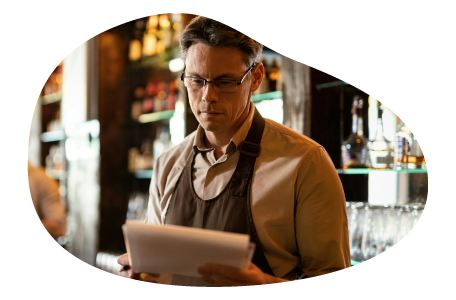

Why is insurance a must for restaurants?
If a customer suffers an allergic reaction, legal costs could financially devastate your business. Restaurant insurance coverage can pay for lawsuits, accidents, and injuries, giving you peace of mind to focus on your passion.

Find coverage that matches your risks
5 insurance policies every restaurant owner should consider
These insurance products defend restaurants against common risks and fulfill the requirements of state laws and contracts.
Business owner's policy
Small, low-risk restaurants are usually eligible for a business owner's policy (BOP). This policy bundles general liability coverage and commercial property insurance at a discount.
- Customer bodily injuries
- Business property damage
- Business interruption coverage
General liability insurance
A general liability policy covers legal costs related to third-party accidents, such as a customer who slips on a wet floor. It's often required by commercial leases and franchise agreements.
- Slip-and-fall injuries
- Accidental damage to customer property
- Copyright infringement
Workers' comp insurance
Most states require restaurants with employees to carry workers' compensation insurance. Health insurance can deny claims for on-the-job injuries, which makes this policy valuable for sole proprietors too.
- Medical bills for injured workers
- Disability benefits
- Lawsuits from workplace accidents
Commercial auto insurance
Delivery trucks and other vehicles owned by a restaurant must have this coverage to comply with state laws. It helps pay for financial losses in an accident, including legal fees and property repairs.
- Auto accident lawsuits
- Vehicle vandalism
- Theft of a food truck or other vehicle
Cyber insurance
Cyber liability insurance covers costs related to cyberattacks and data breaches. It's strongly recommended for restaurants that handle credit cards and other sensitive customer information.
- Data breach notifications
- Fraud monitoring services
- Ransomware attacks
Restaurant insurance costs

Here's a quick look at the cost of food business insurance policies purchased by TechInsurance customers. On average, restaurants pay the following for coverage:
Business owner's policy: $251 per month
General liability: $141 per month
Workers' compensation: $113 per month
Factors that can influence your premiums include:
- Type of restaurant, such as fine dining, fast food, or cafe
- Number of employees you have
- Types of insurance purchased
- Size of business
- Deductibles and other coverage options
- Claims history
Start a free application to see how much insurance will cost for your business.
Hear from business owners like you who purchased insurance coverage.
Why restaurant owners choose TechInsurance
Get insured quickly with TechInsurance
Get insurance fast so you can sign a commercial lease or contract. Fill out our easy online application, choose a policy, and pay online to start coverage today.

Common questions about business insurance for restaurants
Find answers to frequently asked questions about restaurant liability insurance.
Will insurance cover my restaurant if it's forced to close temporarily?
Yes, you can buy insurance that covers a temporary forced closure. In fact, it's often included in your commercial property insurance or business owner's policy.
Business interruption insurance, also called business income insurance, protects against financial losses when a fire or storm forces your business to close temporarily. It can pay for employee wages, rent, lost profits, and other day-to-day operating expenses.
In addition, extra expense insurance can help pay for even more costs from a closure. You might need to rent a new location, or lease kitchen equipment until renovations are complete.
A fire is costly enough without factoring in lost profits and other expenses, which is why this coverage is essential for a restaurant.
Are restaurants required to have product liability insurance?
Every business in the supply chain can face a product liability lawsuit, which is why this coverage is essential for restaurants. It's often included in your general liability insurance.
Product liability insurance covers the following claims:
- Allergic reactions
- Foodborne illnesses
- Mistakes on food packaging
If you serve food that harms a customer, they might sue your restaurant to recoup their medical expenses or time lost from work. Product liability insurance can pay for attorney's fees, court costs, settlements, and other legal expenses.
Is food poisoning covered by general liability insurance?
Yes, general liability insurance can help pay for a lawsuit related to food poisoning. It also covers other types of customer accidents, such as slip-and-fall injuries and accidental damage to a customer's property.
If your restaurant serves up a batch of undercooked steaks, this policy can help pay for your legal costs, including any settlements or court-ordered judgments.
Keep in mind that it won't cover food spoilage, such as a power outage that forces you to throw away the contents of a refrigerator or freezer. For that, you'll want to add food contamination and spoilage insurance to your BOP or property insurance as a rider or endorsement.
What other insurance coverage do restaurants need?
In addition to the policies mentioned above, the following types of coverage are common in the restaurant industry:
- Liquor liability insurance: This policy covers harm caused by an intoxicated customer who was overserved by your waiter or bartender. It may be required for a liquor license.
- Employee dishonesty coverage: You can add commercial crime insurance to a BOP to protect your business from cash register theft and other dishonest acts, or buy a fidelity bond that will reimburse your clients for employee theft.
- Equipment breakdown coverage: This policy covers costs when a freezer, refrigerator, or other kitchen equipment suffers a sudden breakdown.
- Electronic data processing (EDP) insurance: If a computer loses important data due to a fire or power surge, this policy helps pay for any related losses.
- Employment practices liability insurance (EPLI): If an employee accuses your business of wrongful termination or another violation of their rights, this policy will cover your legal costs.
- Hired and non-owned auto insurance (HNOA): Vehicles that are used but not owned by your business, such as a personal car driven for work, should have this liability coverage, as a personal auto policy won't cover business use.

